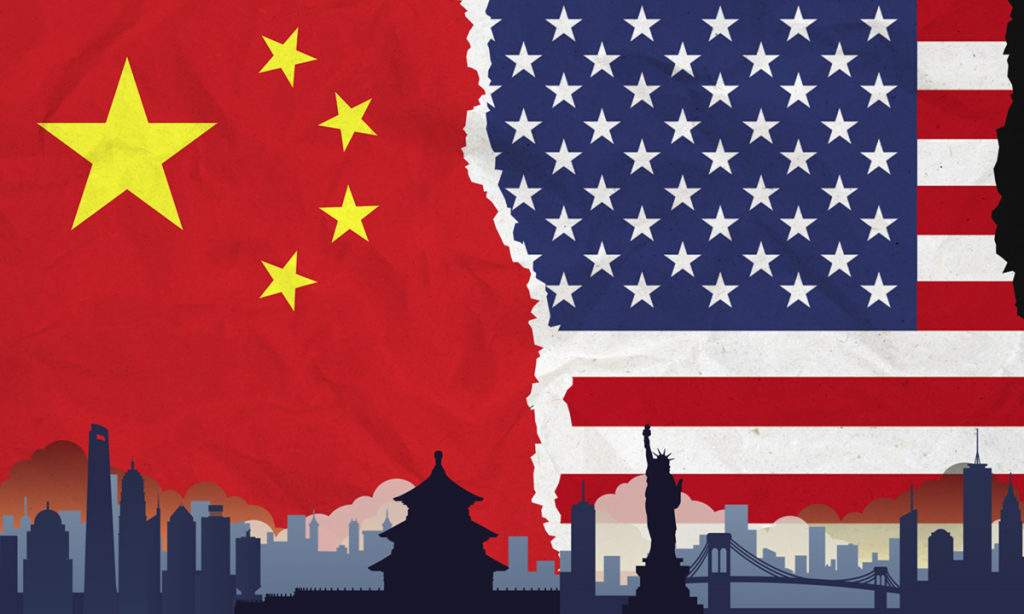Published: March 14,2024
By Wang Cong
and Zhang

China-US Graphic: GT
China’s Foreign Ministry on Tuesday excoriated a series of US’ latest maneuvers that Washington says aim to “outcompete China,” warning that the US’ engagement in malign competition puts the fundamental interests of the Chinese and US peoples and even the future of mankind at stake and will only push the two countries toward confrontation and conflict.
US officials have in recent days stepped up efforts to crack down on and contain China on multiple fronts – from requesting additional funds to “outcompeteChina” and arm the island of Taiwan to trying to lure Asian countries into its tech restrictions against China. All these moves are bad for China-US bilateral ties, the Asia-Pacific region and the entire world, Chinese experts warned.
Chinese officials and experts further pointed out that the US’ focus on major-country contest, politicization of economic and trade issues, and interference in other countries’ internal affairs will not only fail to help address a litany of problems within the US but will actually backfire on the US itself.
Vicious competition
Commenting on the US’ budget for the 2025 fiscal year, which includes funds to “outcompete China” and arm China’s Taiwan region on Tuesday, Wang Wenbin, a spokesperson for the Chinese Foreign Ministry, reiterated that competition is not the true nature of China-US ties and major-country contest will not address problems faced by China and the US.
The US’ attempt to “outcompete China” is not benign competition, but vicious competition, in which the US sets up traps for the competitor at every turn, Wang said at a regular press briefing. “It is an unrestrained gamble that puts the fundamental interests of people of the two countries and even the future of humanity at stake, and it will only push China and the US toward confrontation and conflict,” he said.
The US administration’s budget request for the 2025 fiscal year includes $4 billion over five years in mandatory funding so as to “employ all the tools at our disposal to outcompete China.” The budget request also includes a “first-time funding request” of $500 million to replenish weapons that would be provided to Taiwan, media reported.
Wang on Tuesday also stated China’s firm opposition to military ties between the US and the island of Taiwan and the US’ attempt to arm the island. “We urge the US to abide by the one-China principle and stop interfering in China’s internal affairs. China will take measures to firmly safeguard its sovereignty and territorial integrity,” he said.
In addition to its budget request, the US government has also stepped up efforts that are apparently aimed at further intensifying its technological crackdown campaign against China.
While leading a US business delegation to the Philippines, US Commerce Secretary Gina Raimondosignaled that the US “will do whatever it takes” to crack down on China’s technological capabilities, Bloomberg reported on Monday.
In the Philippines, Raimondo announced that US companies are set to announce investments totaling more than $1 billion in the Philippines, according to Reuters. The US Commerce Secretary said the US’ commitment to expanding trade and investment in the Philippines also extends to “the larger Indo-Pacific region,” even as she reiterated that the US is not seeking to decouple from China.
“This is another vivid manifestation of the US engaging in the so-called major-country contest,” DiaoDaming, a professor at the Renmin University of China in Beijing, told the Global Times on Tuesday.
Diao said that while it is up to the US business community to decide on their own how it forms business strategies, it is clear that the US government is actually engaging in major-country contest out of political and strategic considerations and is pushing for a decouple under the guise of de-risking. “This is not a positive signal for China-US relations, the region or even the world,” he stressed.
Danger for world
The US government’s engagement in zero-sum major-country contest will not only risk confrontation between the world’s two biggest economies, but also draw more countries in the region and around the world into bloc confrontation, at a time when the world needs cooperation the most, Chinese experts noted.
Further underscoring Washington’s intensifying campaign to contain China in a major-country contest, the US government is also pushing its allies, including the Netherlands, Germany, South Korea and Japan, to tighten chip restrictions against China, and is considering adding another Chinese chipmaker, ChangXin Memory Technologies Inc, to its so-called entity list, according to Bloomberg. Meanwhile, the US Congress is rushing a bill that will essentially force Chinese firm ByteDance to sell its popular TikTok or face a ban in the US, a move that Chinese experts have said it’s another hysterical move by Washington to crack down on Chinese firms.
The latest moves by the US reflect “politicians’ mentality in pushing for a decoupling from China,” Li Yong, a senior research fellow from the China Association of International Trade, told the Global Times on Tuesday, noting that US politicians’ tactic of blatantly interfering in businesses is absurd and will not serve their own political purposes. “Using a politicized means to promote business competition is not competition at all.”
US politicians’ intensifying crackdown and containment campaign against China reflect mounting domestic woes within the US, including its evaporating economic and technological dominance globally, that the country cannot address in any effective manner due to partisan divisions and dysfunctions of the government, according to Chinese analysts.
“The Biden administration seeks to bolster the US’ competitiveness by cracking down on China and rectifying its domestic development woes by hyping the so-called external threats. Such a tactic may gain consensus in certain areas in the short term, but it cannot solve the root causes,” Diao said, stressing that the US approach of “treating its internal wounds externally” will not work.
More importantly, such an attempt will not contain China’s economic and technological rise, as businesses, including US companies, driven by market forces not politics, will continue to invest and operate in the Chinese market, experts said.
“Many US business executives are visiting China and expanding investment in China,” Li said, adding that political restrictions on US businesses will only hurt US’ interests.
In an apt example of US firms expanding investment in China, US tech giant Apple announced on Tuesday a plan to open a new research lab in Shenzhen, South China’s Guangdong Province, and upgrade its Shanghai research lab. This comes shortly after the company just announced to open a new store in downtown Shanghai.
globaltimes.cn
 Africa -China Review Africa -China Cooperation and Transformation
Africa -China Review Africa -China Cooperation and Transformation
